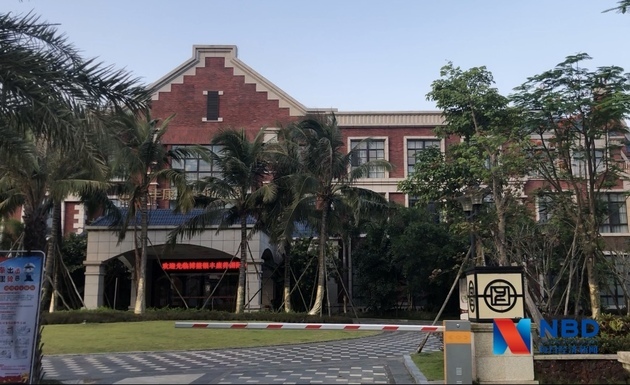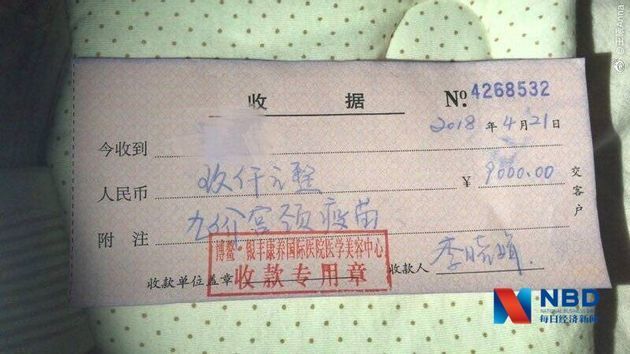
Boao Yinfeng Healthcare International Hospital/Photo by Liu Ling (NBD)
Apr. 29 (NBD) – A private hospital in southern China's Hainan Province has been sealed up after an investigation discovered it had illegally injected 38 people with fake 9-valent human papillomavirus (HPV) vaccines since January 2018.
An announcement issued by the local health authority confirmed the hospital's illegal practice, saying the hospital isn't qualified for vaccination and slapping the hospital with penalties including a warning and confiscation of illegal gains and a fine of 8,000 yuan (1,188.5 U.S. dollars) in addition to revoking its business license.
Dozens of people get fake shots
On April 22, a Weibo account dubbed "Wang Xi Anna" exposed that Boao Yinfeng Healthcare International Hospital ("Boao Yinfeng") gave fake 9-valent HPV vaccines to 38 people including a pregnant female and herself, claiming the vaccines were smuggled or from a factory of Siping, northeast China's Jilin province.
It is noticed that the hospital began administering the allegedly fake HPV shots three months before Merck & Co Inc.'s Gardasil vaccine against HPV was approved by the Chinese regulator in April last year.
Regarding the accusation, Boao Yinfeng replied on April 28 that it has nothing to do with the matter and it is a beauty company in Qingdao that illicitly promoted and sold the fake vaccines.
The beauty firm was found to be a former partner of the hospital's cosmetics department. In an interview with NBD, the hospital again denied the cooperation with the beauty company. Meanwhile, it underscored it has no idea about the vaccines and individuals who were reported to give shots to the 38 people were not its employees.
But affected patients didn't buy the statement, saying in light of the payment and immunization process, it's impossible that the hospital is unrelated to the matter.
"How come the hospital didn't know the matter as the people who gave us fake vaccines all wore white gowns with the hospital's name on them and the injections were conducted in the hopsital?" some patients asked.

A receipt carrying Boao Yinfeng's special seal shows the patient was charged 9,000 yuan (1,337 U.S. dollars) to be immunised. (Photo provided by a patient to NBD)
In addition to outrage, the affected patients are worried about their health. "The hospital hasn't yet provided any measures and compensation options," they protested, "the fine imposed was even less than the payment of a single person for the fake vaccine."
A hospital consultant who declined to be named said to NBD, "the fake shot is just normal saline and would do no harm to health." But this didn't quell the patients' feeling of unease. "The shots were given at different times and not from the same batch, and we know nothing about what was injected into our body," some patient cried.
In a field visit on April 29, NBD found the hospital has been sealed up.
Brisk demand for HPV vaccines in China
Bao Lei, person-in-charge of a medical care company in Guangzhou, revealed in an interview with NBD that the insufficient supply of such vaccines is an important reason of the chaotic market situation.
"The 9-valent HPV vaccine is exclusively supplied by U.S. pharmaceutical firm Merck & Co Inc.," Bao explained, "and the production procedures are complicated with a long production cycle."
Amid the excessive demand, smuggled and counterfeit vaccines thus came to the market. How to safeguard the security of vaccines and strike a balance between the supply and demand is a problem to be solved.
NBD noticed that Hainan was the first in mainland China to receive the 9-valent HPV vaccine, with the first batch arriving in the city at the end of May in 2018.
Due to optimistic claims that HPV vaccines could prevent cervical cancers, the 9-valent injection has been highly sought-after in China. Since then, the brisk demand has drained the supplies of HPV vaccines in mainland China.
Due to the short supply, Shenzhen even unveiled a lottery system for the vaccination last year.
In Chengdu, health centers also opened online channel for pre-orders. "It was so crazy that the vaccines were snapped up in only one second!" a consumer in the southern city said to NBD.
In fact, before the vaccine was sold in mainland China, plenty of people flocked to Hong Kong for immunisation. Data showed about two million women from the mainland travelled to Hong Kong for HPV vaccination annually in recent years.
Now, the dearth of vaccines in mainland China makes Hong Kong remain a hot choice.
As a result, the shortage of HPV vaccine was exacerbated and the cost of vaccine has surged to 7,000 HK dollars (892.5 U.S. dollars) from 4,000 HK dollars (510.0 U.S. dollars) in 2017, a consumer disclosed.
Wang Gang, in charge of the R&D of a vaccine company, held that consumers' hunger for the vaccine will last for a long period of time but will finally diminish, especially after domestic vaccine is for sale.
Listing HPV vaccination into the national immunization program (NIP) like the U.S., the U.K. and Canada might be a direction for the future of China's HPV vaccine market, Wang noted.
Email: lansuying@nbd.com.cn


 川公网安备 51019002001991号
川公网安备 51019002001991号





